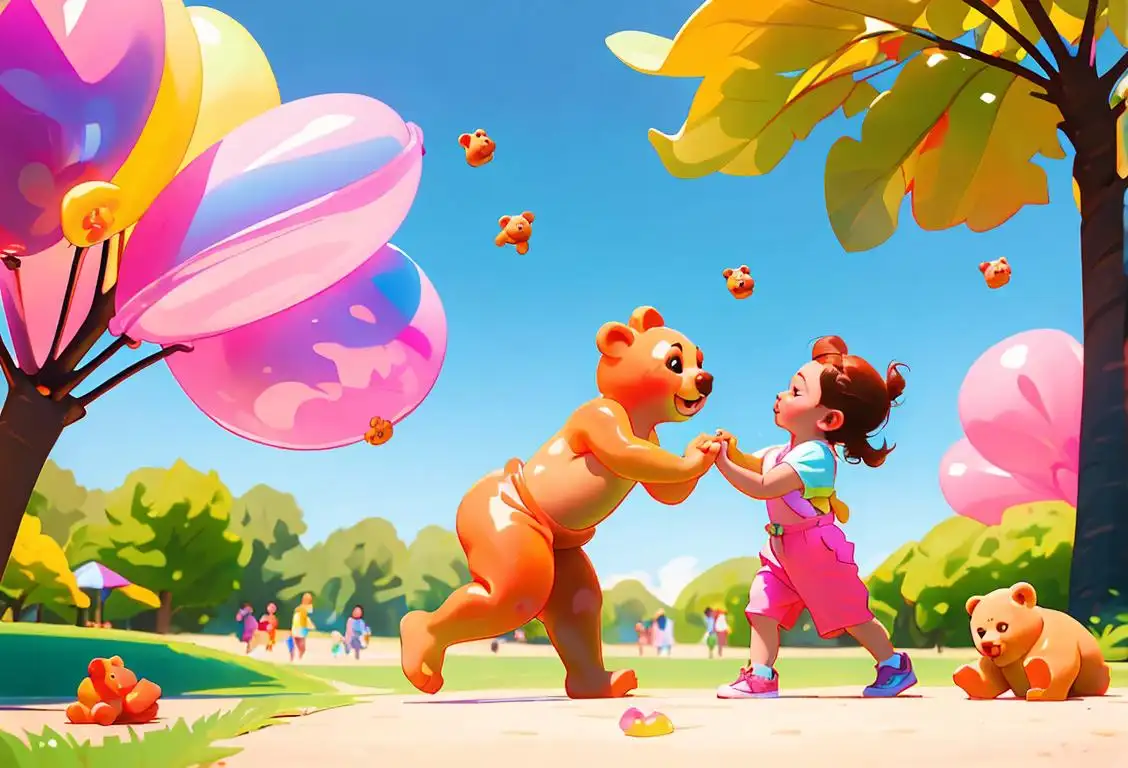National Gummi Bear Day

Once upon a time, on a bear-y special day, everyone celebrated the squishiest, fruitiest, most delectably delightful sweet treat known to man - the gummi bear! This is an ode to National Gummi Bear Day, where on one fateful day, the Internet collectively burst into a candy-coated rapture with 14 historical mentions of our gelatinous friends.
When is Gummi Bear Day?
It's national gummi bear day on the 15th July.
THE RISE OF THE GUMMI
Bear with me while we take a trip down memory lane, all the way back to 15th July 2015. This date witnessed the peak of gummi bear fever, with the Internet collectively crying out in a chorus of unwavering sweetness. Perhaps it was the stretchiness, maybe it was the rainbow of fruit flavors, or it could've just been the irresistible child-like joy of chewing on these adorable bear-y treats.
A SWEET SURPRISE
Gummi bears made their grand entry into the world in the early 1920s in Germany, the creation of a man named Hans Riegel. These chewy, gel-filled treats quickly became a hit, leading to the birth of his company Haribo, which lovingly stands for Hans Riegel Bonn. Its logo, a jovial bear, became a symbol across households worldwide.
A GUMMI WORLD
Throughout the years, the gummi bear has evolved with considerable quantities of creativity and, dare we say, a sprinkling of madness. They've been magnified into giant gummi bears, been calibrated into every flavor imaginable, and even witnessed a short-lived animated television show, aptly titled 'Disney's Adventures of the Gummi Bears.'
CANDY-PALOOZA
So, isn’t it about time we celebrated their existence on a grand scale? Enter National Gummi Bear Day, a day splashed with sweetness and nostalgia. On this day, people across the globe celebrate by indulging in their favorite gummi bear flavors, sharing gummi-inspired recipes, or by simply relishing in the joy of this timeless candy.
History behind the term 'Gummi Bear'
1922
The Birth of the Gummi Bear
The term 'gummi bear' originated in 1922 with the creation of the world's first gummi candy. The candy was invented by Hans Riegel, a German confectioner from Bonn. He was inspired by a popular street food called Turkish delight, which was made from chewy fruit flavors and was enjoyed by many. Riegel wanted to create a similar treat that could be enjoyed by both children and adults.
1920
The Invention of Gummi Candy
In the year 1920, a German confectionery company named Haribo was the first to successfully create gummi candy. The company's founder, Hans Riegel, was inspired by the idea of making a new type of treat using the gelling agent agar, which is derived from seaweed. These chewy candies came in various shapes and flavors, and they became an instant hit among candy lovers in Germany.
1920
Hans Riegel Sr. opens a candy company.
In 1920, German confectioner Hans Riegel Sr. opened a candy company called 'Haribo' in Bonn, Germany. The company specializes in producing sweet treats like licorice and hard candies.
1922
The Invention of Gummi Candy
In 1922, the German confectioner Hans Riegel Sr. founded a company called Haribo in Bonn, Germany. He started producing gelatin-based candies, inspired by the popular form of Turkish delight. The word 'gummi' in 'gummi bear' comes from the German word 'Gummi', meaning rubber or elastic. These soft, chewy candies became a hit among children and adults alike.
1922
Hans Riegel Sr. establishes Haribo
In 1922, Hans Riegel Sr., a confectioner from Germany, established a confectionery company called Haribo. The name Haribo is an abbreviation of his own name and the city he was born in (Hans Riegel Bonn). At this time, Haribo primarily produced hard candies and licorice.
1922
The Birth of the Gummi Bear
In 1922, the famous confectionery company, Haribo, introduced the world to a delightful new candy known as the Gummi Bear. Created by German candy maker Hans Riegel, this bear-shaped jelly candy quickly captured the hearts and taste buds of people around the globe.
1920
The Invention of Gummi Candy
In 1920, Hans Riegel, a German confectioner, invented gummi candy. He founded the company Haribo and began producing his iconic gelatin-based sweets. The original inspiration for the gummi bear came from a dancing bear street performer Hans had seen as a child.
1922
Hans Riegel's Sweet Invention
In 1922, Hans Riegel, a German confectioner, founded his candy company called Haribo. One of the earliest and most popular creations of Haribo was the 'Gummibärchen,' which translates to 'gummy little bear.' These bear-shaped candies were made from a mixture of gelatin, sugar, and fruit flavoring, giving them a unique texture and taste.
1922
Hans Riegel's Invention
In 1922, a German confectionery company called Hans Riegel, Sr. created the world's first gummi bear. The candy was originally called 'dancing bear' and was made using a gummy, jelly-like substance known as gum arabic. The candy was designed to be chewy and flavorful, capturing the attention of both children and adults.
1967
The Brand 'Gummibär'
In 1967, a company named Haribo launched the brand 'Gummibär,' translating to 'gummi bear' in English. Haribo gained immense popularity with their gummi bears, becoming iconic in the candy industry. The original gummi bears were made in various fruit flavors and had a distinctive translucent appearance.
1967
The Spreading Popularity
By 1967, Gummi Bears had gained immense popularity, becoming a beloved treat for children and adults alike. People were drawn to their soft and chewy texture, vibrant colors, and fruity flavors. Their adorable bear shape also became an iconic symbol.
1966
The Birth of the Gummi Bear
In 1966, the first gummi bear was introduced to the world. Hans Riegel Jr., the son of the Haribo founder, developed the idea of creating a bear-shaped candy. The gummi bear became an instant success, captivating both children and adults with its colorful appearance and chewy texture.
1967
The Birth of Gummi Bears
In 1967, a breakthrough occurred in the world of gummi candy. Hans Riegel's company, Haribo, introduced a new and iconic shape known as the 'Gummibär' or Gummi Bear. These bear-shaped candies quickly gained popularity due to their cute appearance and delightful fruity flavors. Inspired by the dancing bears from street festivals, these treats became beloved not only in Germany but also worldwide.
1967
The Creation of the Gummi Bear
In 1967, Hans Riegel Jr., the son of Haribo's founder, came up with the idea of creating a bear-shaped gummi candy. The idea was to make a chewable, fruity, and cute treat that would become immensely popular. The initial design was based on a dancing bear, which was a traditional motif in German folklore. The first gummi bears were manufactured using a starch mold, giving them their distinct shape and texture.
1960
Launch of Haribo Gummi Bears
In 1960, Riegel's company, Haribo, introduced their iconic gummi bears to the world. These bear-shaped candies quickly gained popularity due to their unique texture, fruity flavors, and adorable appearance. The name 'gummi bear' was coined to describe these gelatin-based candies. The chewy and bouncy texture of the candy, similar to that of a bear's gummy flesh, led to the term 'gummi bear' becoming a household name.
1960
Hans Riegel Jr. invents the Gummi Bear
In the 1960s, Hans Riegel Jr., the son of Hans Riegel Sr., revolutionized the confectionery industry with the invention of the Gummi Bear. Drawing inspiration from trained bears he had seen at fairs, he created a new type of soft, chewy candy in the shape of a bear. These candies were made using a unique gum arabic mixture, which gave them their distinctive texture and made them different from traditional hard candies.
1922
Hans Riegel Sr. invents the gummy bear.
In 1922, Hans Riegel Sr. revolutionized the candy industry by inventing the gummy bear. Inspired by the dancing bears he saw at fairs, he created a chewy, gelatin-based candy in the shape of a bear. The candy quickly grew in popularity, becoming a favorite among children and adults alike.
1967
The Journey to America
By 1967, the gummi bear had gained popularity and caught the attention of another confectionery company, known as Mederer. The owner, Arthur Mederer, decided to establish Trolli, an American offshoot of Haribo. As a result, Trolli introduced the gummi bear to the United States, quickly becoming a sensation in the American candy market.
1980
Popularity and Cultural Impact
Throughout the 1980s, gummi bears soared in popularity and became a cultural phenomenon. The catchy jingle 'I'm a Gummi Bear (The Gummi Bear Song)' was released in the 1980s and became an instant hit. The lovable cartoon characters in the animated TV series 'The Adventures of the Gummi Bears' (1985-1991) further cemented the candies' place in popular culture. Gummi bears became a beloved snack cherished by children and adults alike.
1981
Disney's Gummi Bears
The term 'gummi bear' received a significant boost in popularity in 1981 when the Walt Disney Company aired the animated TV series 'Disney's Adventures of the Gummi Bears.' The show featured a group of lovable anthropomorphic bears who lived in a hidden kingdom and had magical abilities. The TV series played a crucial role in further promoting the already beloved gummi bear candies.
1967
The candy is introduced in the U.S.
In 1967, the gummy bear made its debut in the United States. German immigrant and founder of the Trolli brand, Mederer, introduced the candy to the American market. It gained a significant following, solidifying its place in American candy culture.
1981
Gummi Bears Take Over TV
One of the most significant moments in the cultural impact of gummi bears came in 1981 with the premiere of the animated TV show 'The Adventures of the Gummi Bears.' This show, created by Walt Disney Productions, depicted the adventures of a group of anthropomorphic gummi bears with magical abilities. It became a huge success and ran for six seasons, captivating children and adults alike with its enchanting storytelling and lovable characters.
1981
Gummi Bears Animated TV Series
In 1981, the animated TV series 'The Adventures of the Gummi Bears' premiered. This popular show brought the world of gummi bears to life, featuring a group of magical gummi bears with various abilities. The show boosted the popularity of gummi bears and cemented their place in popular culture.
1981
Introduction to the United States
In 1981, Gummi Bears made their way to the United States. The American candy company, Dole, introduced Haribo's Gummi Bears to the American market. They quickly became a sensation, captivating children with their adorable appearance and delicious flavors. The cute and colorful bears in various fruity flavors, such as strawberry, orange, raspberry, and lemon, gained widespread popularity and became a staple in candy aisles across the nation.
1981
Introduction in the United States
In 1981, gummi bears made their introduction in the United States. The American candy company, Trolli, was the first to produce gummi bears domestically. The colorful, chewy candies quickly gained popularity, captivating the American market with their unique texture and flavors.
1980s
Television Fame
The 1980s marked a significant turning point for Gummi Bears. They became cultural icons when an animated TV show called 'The Adventures of the Gummi Bears' premiered in 1985. The show followed the adventures of a group of Gummi Bears with magical abilities, bringing these sweet treats to life in the imaginations of children worldwide.
1967
Haribo introduces Gold-Bears
In 1967, Haribo introduced their iconic Gummi Bears to the market, naming them Gold-Bears. These colorful and flavorful treats became an instant hit, captivating the taste buds of millions of people around the world. The Gold-Bears were initially available in five different flavors: strawberry, lemon, orange, pineapple, and raspberry.
1997
World Gummi Bear Day
In 1997, gummi bear enthusiasts and candy lovers worldwide celebrated the first World Gummi Bear Day on July 15th. This day serves as an opportunity to indulge in these delightful chewy treats and recognize their enduring popularity. Since then, it has become an annual celebration of all things gummi bear-related, bringing people together to enjoy and appreciate these iconic candies.
1990s
Gummi Bears and Health Craze
Amid the health-conscious trends of the 1990s, Gummi Bears encountered some controversy. Many perceived them as unhealthy due to their sugar content. However, some gummy manufacturers adapted by introducing sugar-free versions, catering to those who desired a guilt-free indulgence.
1985
Gummi Bears Animated Series
In 1985, an animated television series called 'The Adventures of the Gummi Bears' premiered. The show revolved around the fictional kingdom of Dunwyn, where talking gummi bears coexisted with humans. The series further popularized gummi bears, sparking a renewed interest in the candy and inspiring a generation of fans.
1981
Disney's 'The Adventures of the Gummi Bears' premieres.
In 1981, Disney released an animated television series called 'The Adventures of the Gummi Bears.' The show followed the adventures of a group of anthropomorphic bears living in a magical forest. The series helped to popularize the term 'gummi bear' even further, making it a household name.
1982
Gummi Bears Invade Grocery Stores
By 1982, the popularity of gummi bears had skyrocketed. Haribo's Gummi Bears became widely available in grocery stores across the United States, marking their official entry into the American market. These delightful candies continued to captivate consumers with their chewy texture and mouthwatering flavors, eventually becoming a staple treat enjoyed by people of all ages.
1990s
Expansion of Gummi Bear Varieties
In the 1990s, the success of gummi bears led to the expansion of the gummi candy market. Manufacturers started producing gummi bears in a variety of flavors, sizes, and shapes, beyond the original bear shape. Today, you can find gummi bears in countless flavors, ranging from traditional fruit flavors to novelty ones like sour, cola, and even spicy flavors. Gummi bears have become a staple treat around the world, delighting candy enthusiasts of all ages.
1989
Gummi Bears TV Show
In 1989, a popular animated TV series called 'Disney's Adventures of the Gummi Bears' premiered. The show followed the adventures of a group of anthropomorphic gummi bears with magical abilities, living in the medieval kingdom of Dunwyn. The TV series helped in cementing the popularity of gummi bears as the lovable characters became household names. The association with the TV show further enhanced the cultural impact of the term 'gummi bear'.
1992
Gummi Bear-Inspired Hip-Hop Song
In 1992, the song 'I'm Your Gummi Bear (The Gummy Bear Song)' was released. It became a viral hit, spreading the joy of gummi bears to millions of people around the world. The catchy tune and playful lyrics contributed to the enduring popularity of gummi bears.
1980s
Gummi Bears gain popularity worldwide
During the 1980s, Haribo Gold-Bears gained immense popularity not only in Germany but also worldwide. The cute and chewy candy bears became a beloved treat for both children and adults. The success of Haribo's Gummi Bears inspired other confectionery manufacturers to create their own versions of gummi candies, leading to a proliferation of gummi snacks in various shapes, sizes, and flavors.
1992
Gummi bears receive their own National Day.
In 1992, National Gummi Bear Day was established to celebrate the beloved chewy candies. Every year on July 15th, people across the United States indulge in these fruity treats to honor their deliciousness and cultural impact.
Present
Continued Iconic Status
Today, gummi bears are recognized as an iconic candy worldwide. They have become a symbol of childhood nostalgia and are enjoyed by people of all ages. Gummi bears have evolved with time, now available in a wide range of flavors, colors, and even sugar-free versions. Whether used in baking, as a topping, or simply enjoyed as a snack, gummi bears continue to bring joy to people around the globe and have firmly established themselves as a beloved confectionery item.
Present
Continued Popularity and Innovation
Gummi bears continue to be incredibly popular worldwide. They are not only enjoyed as a standalone candy but are also used in various desserts, including ice creams, cakes, and even cocktails. As the demand for healthier snacks rises, newer versions of gummi bears made with natural colors and flavors, as well as vegetarian and vegan options, have become increasingly available.
2007
World's Largest Gummy Bear
In 2007, a company named 'Vat19' created the world's largest gummy bear. This colossal candy weighed around 5 pounds and stood over 9 inches tall. The giant gummy bear was available in various flavors and became a viral sensation, captivating candy enthusiasts worldwide.
2000s
Gummi Bear Craze Goes Global
In the 2000s, the Gummi Bear craze went global. They became a popular candy not only in Germany but also in various countries worldwide. Gummi Bears took on different shapes and flavors to suit regional preferences, showcasing their ability to adapt and captivate consumers of all ages.
Present
Gummi Bears continue to be an iconic confectionery
Today, Gummi Bears remain one of the most iconic and enduring confectionery products in the world. Haribo continues to be one of the leading manufacturers of Gummi Bears, producing them in different variations and flavors. Gummi Bears have not only become a popular sweet treat but have also inspired various forms of merchandise, television shows, and even an animated series called "The Adventures of the Gummi Bears." They have truly left a lasting cultural impact on the world of confectionery.
1997
Gummi Bear's 75th Anniversary
In 1997, Haribo celebrated the 75th anniversary of their iconic Gummi Bears. The delectable candies had become a timeless classic, loved by generations worldwide. The company continued to innovate and introduce new flavors, ensuring that these chewy treats remained a beloved confectionery staple for years to come.
2010
Gummi Bear Sculptures
In 2010, an artist named YaYa Chou created intricate sculptures made entirely out of gummi bears. These sculptures, ranging from small pieces to life-size installations, showcased the versatility and cultural impact of gummi bears. They brought a new level of artistry to the world of candy.
Present
Everlasting Legacy
Today, Gummi Bears remain a beloved and iconic candy. They hold a special place in the hearts of people from different generations, creating nostalgic memories of childhood and offering a playful, sweet treat for lovers of gummy confections. The legacy of the Gummi Bear continues to endure and delight.
Did you know?
Did you know that the largest gummi bear in the world is a whopping 26 pounds, equivalent to about 1400 regular-sized gummy bears!Tagged
awareness food fun loved ones rememberanceFirst identified
15th July 2015Most mentioned on
15th July 2015Total mentions
14Other days
Happiness Day
Bbq Day
First Responders Day
Meatball Day
Trivia Day
Cheese Lovers Day
Biscuit Day
Pumpkin Day
Agriculture Day
Knife Day









